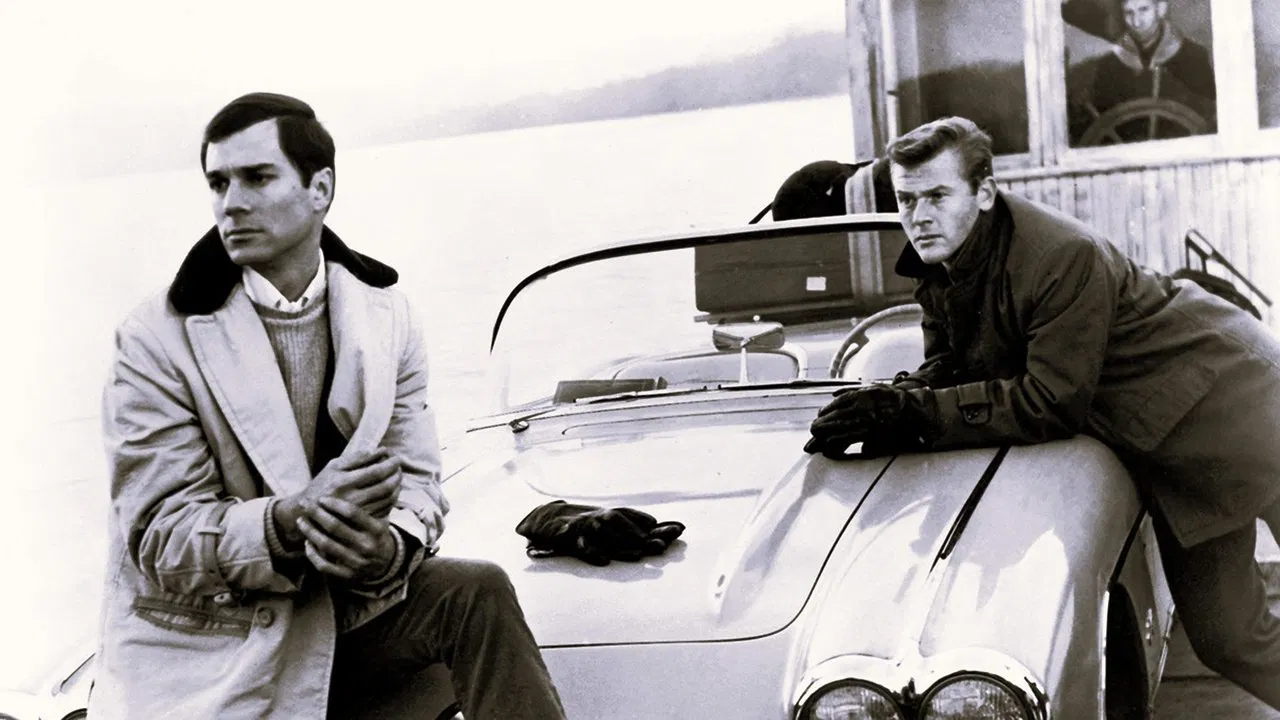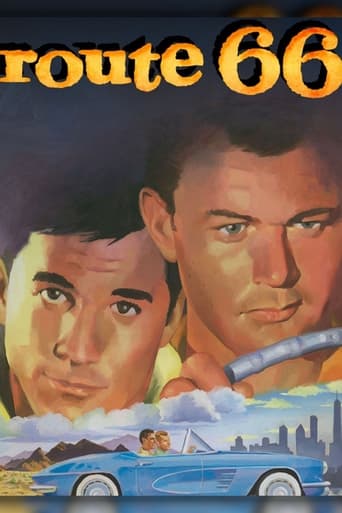

Powerful
... View Morejust watch it!
... View Morebrilliant actors, brilliant editing
... View MoreIt isn't all that great, actually. Really cheesy and very predicable of how certain scenes are gonna turn play out. However, I guess that's the charm of it all, because I would consider this one of my guilty pleasures.
... View MoreDespite some opinion, the series was and is more than just a cool Corvette, the envy of thousands of teenage boys of the time.The series is a one-of-a-kind that helped define a new era of TV programming. Unlike studio-bound 1950's TV, Route 66 went on the real road for story backgrounds. Thus the episodes provide glimpses of an unvarnished America, unfashionable and undesigned. Locales might vary week-to-week, from the seedy to the suburban to the penthouse, or somewhere in-between. But in the background was always America's great symbol of freedom, the open road. A temptation that even the country's sprouting suburbs couldn't contain. Of course, Buzz and Todd's backgrounds made plot versatility possible— Todd the educated upper-class young man, Buzz the tough slum kid. Together, they sort of coexisted in interesting fashion on-screen, perhaps because of the actors' testy off-screen relationship. Unfortunately, Glenn Corbett, Maharis's successor, lacked his predecessor's brooding intensity and the show was soon cancelled. However that may be, the series often featured name actors from Hollywood or talented newcomers. These too added genuine audience appeal.Just as important was the writing. Head writer Silliphant managed to maintain a generally extraordinary level of narrative interest-- with compelling characters, rarely heard poetic dialog, and often ironical or poignant outcomes that were unlike the usual happy endings of the day. Scripts specialized in revealing lost or forgotten souls at a time when TV generally ignored them amid rising suburban prosperity. Then again, audiences never knew where the guys would be the following week since the only constant was the open road. So if you didn't like this week's episode, next week would be a different cast of characters in a new story with unpredictable locales. All in all, I don't think the complex format has been replicated since. Despite the show's popularity, it didn't spawn imitators, probably because of that difficulty.Anyway, I never missed the show then, and am happy it's made available to fresh generations-- after all, whatever else changes, that open road still beckons.
... View MoreTV Viewers these days simply cannot and will not appreciate Route 66 - they can't sit still long enough to understand the story lines! Young viewers - 30's and younger - simply cannot comprehend an intelligent show that makes it's audience actually think. Viewers want a show that has more slapstick than knowledge - if they'd just get through a couple of episodes perhaps they'd understand the greatness of Route 66. It's a bygone era and a bygone style of TV writing. So sad for the young viewers - they have no idea what they're missing. Because it's in Black and White, they feel it's "too old" "Outdated" and don't even try. I love the episodes from my home state! I do believe, with the County Libraries help, I've managed to re-watch every episode of Route 66, even that first illusive episode - Black November. It is interesting seeing actors' (Ed Asner, Suzanne Pleshette, Julie Newmar, etc.) guest appearances on these shows! Tod, Buz and Linc were such Good Guys! Such good all American boys traveling to good All American towns. There's love friction, violence, social issues - everything a show has to offer! Route 66 has it all!
... View MoreLoved the series, never got to see it when I was a kid, and saw a set of DVD's on evil-bay. Now, having learned to appreciate the writing of some early TV series in comparison to the junk we have today, I pulled the trigger and bought the whole set. Absolutely wonderful; sure, some episodes are better than others, but that's true about any series. The versions I bought were 12 disks, about 10 episodes a disk. In old black and white, they seem to have been recorded over the air, with occasional artifact. But none of that affects the story lines. Do yourself a favor, and get the whole set at once, and see it the way it was, full screen. Some reviews say that the new remade DVD's have been cropped to appear to be wide screen, what a shame.
... View MoreI just received an e-mail from Amazon.com that the second series of this series is soon to be released. Orders can now be taken by logging on to Amazon. The release date is in October....The price is listed at $36.99 and Amazon says that you will save 26% by ($12.99) by ordering early. I was kind of surprised by the personal notification from Amazon....it seems that they pay attention to who orders what items, and notify you of current releases.I've already ordered mine, and can't wait to see more of this series that I entirely missed when I was young. I see that a lot of other old and "lost" series are being released, so I guess this is something we can all look forward to.Regards:Rich O
... View More